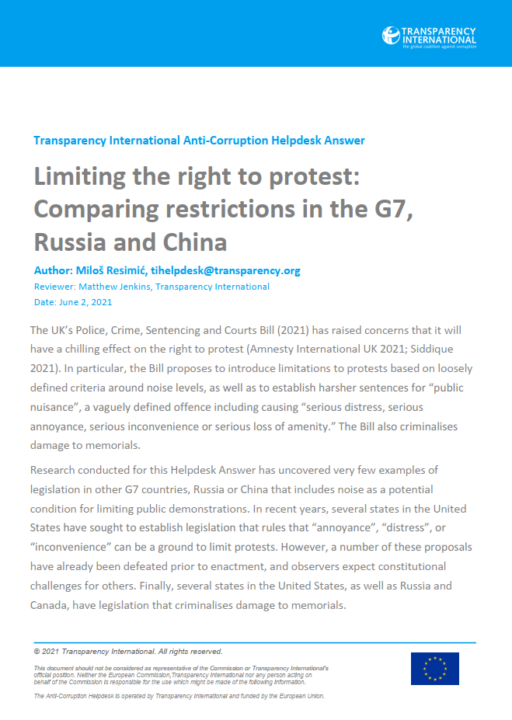- Home
- Anti-Corruption Helpdesk
- Limiting the right to protest: Comparing restrictions in the G7, Russia and China
Limiting the right to protest: Comparing restrictions in the G7, Russia and China

This Anti-Corruption Helpdesk brief was produced in response to a query from one of Transparency International’s national chapters. The Anti-Corruption Helpdesk is operated by Transparency International and funded by the European Union.
Query
Earlier this year, the UK Government introduced the Police, Crime, Sentencing and Courts Bill. How do the following provisions compare to other G7 countries, Russia, and China: a) conditions for limiting protests, b) definition of and sentencing for “public nuisance”, c) criminalising damage to memorials?
Summary
The UK’s Police, Crime, Sentencing and Courts Bill (2021) has raised concerns that it will have a chilling effect on the right to protest (Amnesty International UK 2021; Siddique 2021). In particular, the Bill proposes to introduce limitations to protests based on loosely defined criteria around noise levels, as well as to establish harsher sentences for “public nuisance”, a vaguely defined offence including causing “serious distress, serious annoyance, serious inconvenience or serious loss of amenity.” The Bill also criminalises damage to memorials.
Research conducted for this Helpdesk Answer has uncovered very few examples of legislation in other G7 countries, Russia or China that includes noise as a potential condition for limiting public demonstrations. In recent years, several states in the United States have sought to establish legislation that rules that “annoyance”, “distress”, or “inconvenience” can be a ground to limit protests. However, a number of these proposals have already been defeated prior to enactment, and observers expect constitutional challenges for others. Finally, several states in the United States, as well as Russia and Canada, have legislation that criminalises damage to memorials.
Main points
- There are very few examples of legislation that lists “noise” as a potential condition for limiting protests. The only cases identified while researching this Helpdesk answer are all at the state level in the United States: Utah, Tennessee, Georgia, Connecticut, and Indiana. At present, only those in Utah and Tennessee have been enacted.
- Recently, two other bills in Maryland and Arkansas that sought to establish “unreasonable noise”, “public inconvenience”, “alarm” or “annoyance” as grounds to limit protest were defeated, while another one in Maryland was withdrawn by the sponsor.
- Russia, Canada, China, and several states in the United States have legislation that criminalises damage to memorials.
- Many other restrictive criteria have been introduced in a recent wave of “anti-protest” legislation, including provisions related to “blocking traffic”, “critical infrastructure”, “camping on state property”, “causing identification of a police officer”, and others.
Contents
- Introduction
- Imposing limitations on protests
- Definition of and sentences for public nuisance
- Legislative provisions on damage to memorials
- Conclusion
Authors
Miloš Resimić, [email protected]
Reviewer
Matthew Jenkins, Transparency International
Date
15/06/2021
Tags
 Download PDF
Download PDF
